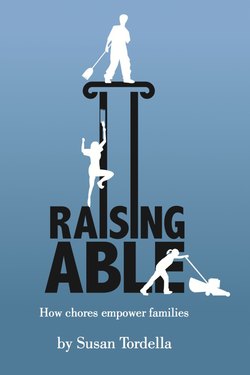Читать книгу Raising Able - Susan Tordella - Страница 3
На сайте Литреса книга снята с продажи.
Preface
ОглавлениеThe key is changing our habits, and in particular,
the habits of our mind.
Pema Chödrön
My approach to parenting changed radically after one lazy August afternoon at the community swimming pool when I angrily gave Ian, 21 months, a “time out” in a corner of the chain link fence around the pool while another mother, Jamie Bafundo, watched.
“I told you to leave Noah alone!” I said, and led Ian to a corner for trying to take Noah’s float again. I believed that making Ian suffer for antagonizing his brother was the only way he would learn to behave.
Sound familiar?
Jamie observed the scenario without comment. I didn’t know her well. We started chatting. After a few minutes she said, “Why don’t you come to a parenting class in September? It has helped me be a better mother.”
“I don’t want to go to a gripe session.”
“It’s not that. We read a book together and talk about it. I’ve learned to deal with my children without yelling,” Jamie said.
That was a selling point. The youngest three of Jamie’s five children played peacefully in the same baby pool where mine were fighting. The group would be led by a mother, not an “expert” who had never taken care of children for extended time.
“We’ll have a babysitter to take care of the children during class. We pitch in to pay her,” Jamie said.
Now we were talking. At the very least, I’d have a break from my gang of three born in three in a half years, and hopefully learn something.
“Okay. How do I sign up?” I said.
Jamie Bafundo and the Family Education Center of Delaware introduced me to one consistent positive parenting plan that transformed our family, and provided a foundation for nearly thirty years of parenting. Based on the psychology of Alfred Adler, M.D., the approach shepherded me through thirteen years of sharing my home and car with my four teens and two teenage exchange students.
The Adlerian way became my rudder. I didn’t have to blow in the wind with the latest parenting trends. Alfred Adler was a contemporary of Sigmund Freud and Carl Jung, all members of Freud’s famous Wednesday Group that founded modern psychiatry in the early 1900s. Adler’s psychology is based on the idea the primary need of humans is to belong to a social group. He introduced the concepts of birth order and natural and logical consequences instead of punishment and reward. It is theorized that Adler is not as famous as Freud and Jung because Adler’s writing was less powerful and persuasive.
Adler’s protégé, Rudolf Dreikurs, M.D., translated the dry theory into practice, formed parenting centers and began dispensing advice that made families more democratic and less autocratic. Dreikurs published the seminal book, Children: the Challenge in 1964 with co-author Vicki Soltz. While a bit dated, families today face similar problems that can benefit from the insightful analysis and suggestions in Children the Challenge.
I began taking an eight-week parenting skills study group in the fall and spring, and sometimes one in the summer. After a few years, I learned enough from my mistakes and successes to start co-leading parenting workshops. I like to joke, “I taught what I most needed to learn.”
Our family moved to the Boston area in 1990. I began offering parenting skills workshops at a nearby community center. Parents joined a group to learn a new approach to one of life’s most difficult and rewarding tasks. Some people signed up because they came from a dysfunctional family and wanted to learn a positive parenting approach that they had never experienced.
One participant said, “My parents were both alcoholics. We were left to grow up on our own. I’m lucky I turned out as normally as I did. We want to do something different for our children, but don’t have a clue what a normal family is.” Her husband, Bill, an entrepreneur, set aside Tuesday mornings for eight weeks to learn a positive parenting plan because he said, “My childhood was just as chaotic.”
Other parents came to the workshops because they realized what they were doing wasn’t working. Participants who were the most frustrated and ready to give up were, and still are, the best students because they implement new strategies without question and complete conviction.
Each time I took and taught a workshop, a different aspect of the system intrigued me and I decided, “That’s the key.” My first insight came early when I realized that I was in a power struggle with my oldest daughter, Casey, 6 years old at the time. I learned to avoid the power dance and my home and my heart became calmer.
Casey and I are still two Alpha women who occasionally tussle for power. Learning the mistaken goals of misbehavior (see Chapter 17, Name it and Tame It ) allowed me to identify what the children and I were thinking and feeling, for me be accountable to my role in the conflict, and to have a positive parenting plan ready to respond differently.
Tweaking my response created a cause-and-effect. My family changed dramatically as I began incorporating family meetings and encouragement, and gave up reward, punishment and praise in favor of encouragement and natural and logical consequences. I had a plan and it worked. I felt remarkably better and more confident because the new skills greatly reduced the yelling, threatening and frustration in our family.
